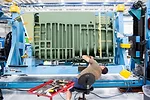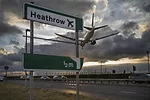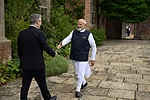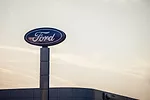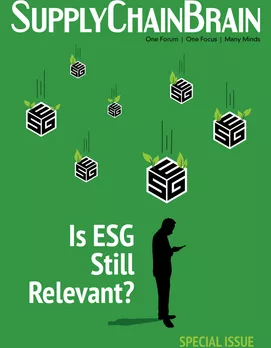
U.K. and India Seal Free Trade Agreement Slashing Tariffs, Barriers
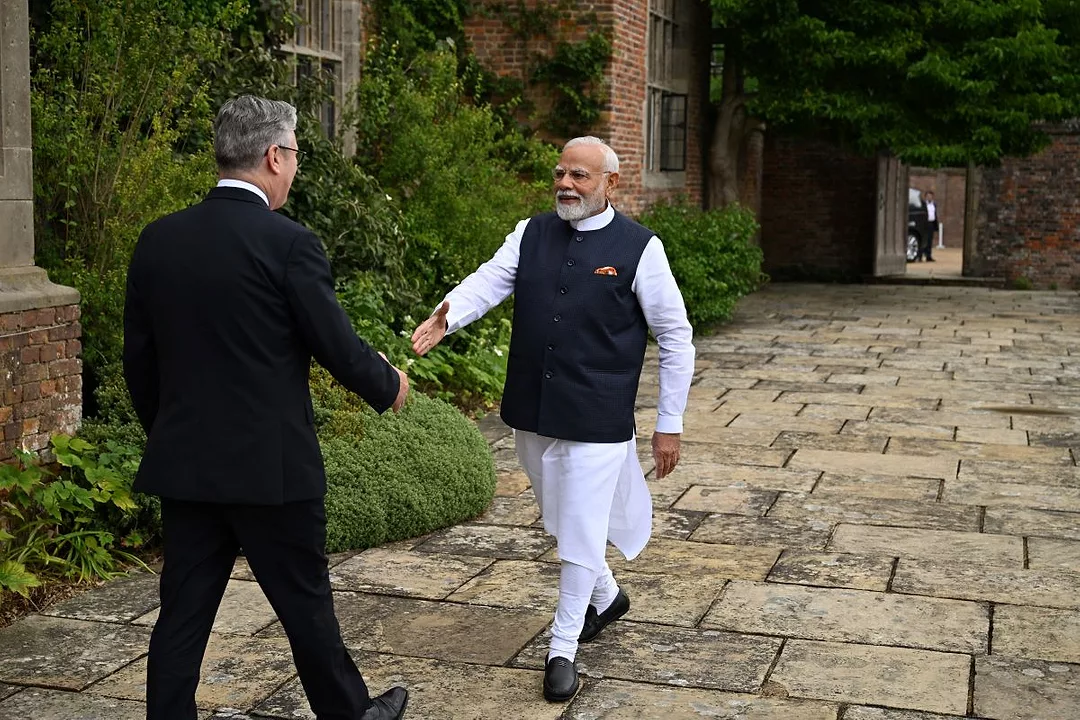
Keir Starmer greets Narendra Modi at Chequers near Aylesbury, July 24. Photographer: Chris J. Ratcliffe/Bloomberg
India and the U.K. sealed a free trade agreement eliminating tariffs on products ranging from cars to alcohol, finalizing a deal between two major economies at a time when U.S. President Donald Trump’s tariff policies continue to disrupt global trade.
Broadcasters on July 24 aired footage showing U.K. Business and Trade Secretary Jonathan Reynolds and his Indian counterpart, Piyush Goyal, signing the agreement at a ceremony near London also attended by U.K. Chancellor of the Exchequer Rachel Reeves and Indian Minister of External Affairs Subrahmanyam Jaishankar. Indian prime minister Narendra Modi has also jetted in to mark the occasion with U.K. Prime Minister Keir Starmer.
“The U.K.-India deal is now signed, sealed and ready to be delivered,” Starmer said, delivering a statement alongside Modi. He said it would bring “huge benefits to both of our countries,” boosting wages, raising living standards and bringing down prices to consumers. Modi, for his part, said Indian goods including textiles, jewelry, agricultural products and engineering goods would get better access in U.K. market. “This isn’t merely paving the way for economic partnership, but is also a blueprint for our shared prosperity,” Modi said.
The pact comes after three years of intense negotiations touching on thorny topics such as visas, tariff reductions and tax breaks. The two nations concluded talks in May, completing Britain’s biggest trade deal since Brexit, and India’s most significant such agreement to date.
With Trump due to arrive in Scotland on July 25 for a personal visit during which he’ll meet with Starmer, the signing comes as Britain works to flesh out the trade pact it agreed with the U.S. Meanwhile the New Delhi administration is racing to clinch a deal with Washington before August 1, when higher tariffs are due to kick in.
For Modi, the trade deal with Britain reinforces his push to position India as a viable alternative for global supply chains looking to diversify. The pact — India’s first major one in a decade — signals that the South Asian nation is willing to lower its barriers to attract investments as it negotiates a bilateral trade deal with the U.S. It will also act as a springboard for India’s ongoing talks with European Union.
For Starmer, the deal will be a welcome step toward his goal of boosting economic growth in the U.K. While it is expected to add £4.8 billion ($6.5 billion) to the U.K.’s annual economic output — a tiny increase to the size of the economy — Starmer’s Labour government hopes successive incremental wins will help encourage investment and turn around lackluster business sentiment.
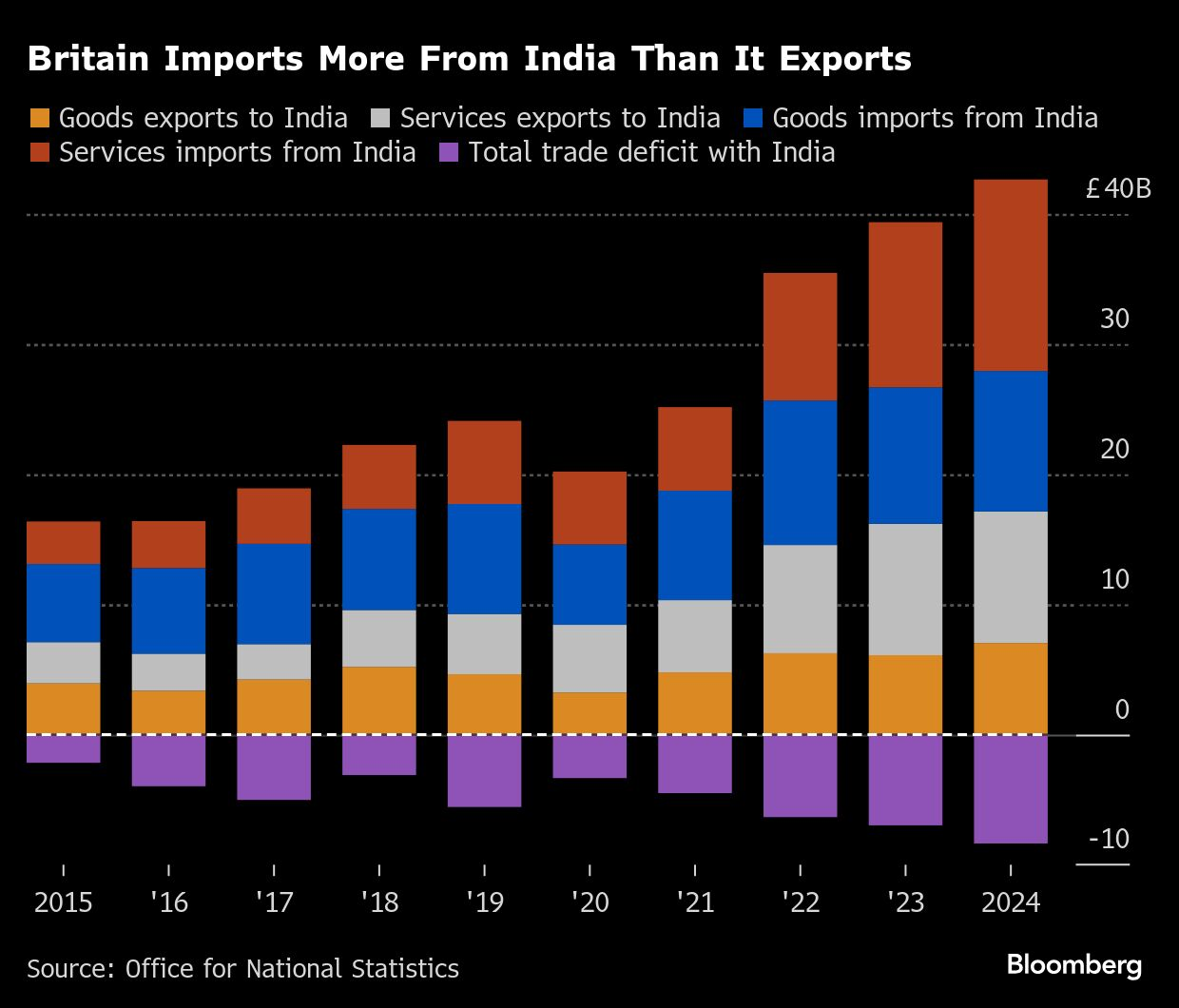
As a part of the deal, some 90% of tariff lines will be reduced for British exports to India, including 85% that will be fully tariff-free within a decade. India meanwhile will see duty reductions on about 99% of tariff lines for goods shipped to Britain. Levies on whisky and gin will be halved to 75% before reducing to 40% by the 10th year of the deal, while automotive industry tariffs will reduce to 10% — under a quota — from 110% over that period.
Businesses from both U.K. and India hailed the agreement and said it would serve as a springboard for long-term partnerships.
The deal will boost “jobs and opportunities for entrepreneurship in both countries” said Anil Agarwal, chairman of Indian mining firm Vedanta Ltd. Auto-to-tech conglomerate Mahindra Group CEO Anish Shah said the partnership reflected India’s global rise. Kirit Bhansali, Chairman of India’s Gem & Jewellery Export Promotion Council said exports to the U.K. could grow to $2.5 billion from $941 million after the deal.
“By lowering tariffs, easing market access, and deepening services and investment flows, this landmark deal unlocks immense potential for both economies,” said Prashant Ruia, Group Chief Executive at Essar, an Indian conglomerate with investments in the U.K.
Meanwhile Rain Newton-Smith, chief executive officer of the U.K.’s biggest business lobby, the Confederation of British Industry, said the announcement “sends a powerful signal” that the U.K. is open for business and committed to free trade. “U.K. firms can take advantage of this new platform to scale, diversify and compete on the global stage,” she said.
Two-way trade between the two nations stood at $21.9 billion in 2024, and the deal is expected to boost bilateral by £25.5 billion a year over the long run.
Starmer and Modi said the two nations also planned to work more closely on areas including defense, migration, technology, climate, education and health as part of a “vision” for 2035. A document outlining that plan said the nations would work jointly to make electric propulsion and jet engines.
Modi — who said he looked forward to hosting Starmer in India “very, very soon” — touched on a wide array of topics in his speech, ranging from militant attacks in Kashmir and the recent Air India crash to cultural references like curry and cricket, a sport he described as a metaphor for the partnership between the two countries.
“There may be a swing and a miss at times, but we always play with a straight bat,” Modi said. “We are committed to building a high-scoring, solid partnership.”
RELATED CONTENT
RELATED VIDEOS
Related Articles
Related Directories
Subscribe to our Daily Newsletter!
Timely, incisive articles delivered directly to your inbox.
Popular Stories
Case Studies
-
Recycled Tagging Fasteners: Small Changes Make a Big Impact
-

Enhancing High-Value Electronics Shipment Security with Tive's Real-Time Tracking
-

Moving Robots Site-to-Site
-
JLL Finds Perfect Warehouse Location, Leading to $15M Grant for Startup
-
Robots Speed Fulfillment to Help Apparel Company Scale for Growth
